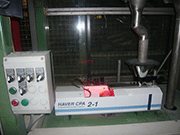E-Archive
Articles
in Vol. 18 - May Issue - Year 2017
HAVER Particle Analysis. Monitoring Fertilizers In Production

Inline production process control using the Haver CPA technology

Example application: Inline particle measurement unit for automatic particle measurement
HAVER & BOECKER is a family-managed, mid-size company with headquarters in Oelde, Westphalia, Germany. Under the umbrella of HAVER & BOECKER OHG, one finds the Wire Weaving and Machinery Divisions. Together with over 50 subsidiary companies on all five continents, HAVER & BOECKER operates worldwide with more than 3,000 employees and 150 representatives. In 2015, the company posted a sales turnover of 456.5 million euros. The Wire Weaving Division produces woven wire cloth and processes it into engineered woven wire products. They are used for screening and filtration by the chemical, plastics, automotive, aviation, aerospace, electronics, foodstuffs and feed industries, as well as for architectural applications and analysis sieves. The Machinery Division and its subsidiary companies HAVER + TYLER, IBAU HAMBURG, SOMMER, BEHN + BATES, FEIGE FILLING and NEWTEC BAG PALLETIZING is specialized in processing, transport, storage, mixing, filling, packing and palletizing of bulk materials. The product range includes packing and loading systems for powder-type and granulated materials, packing machines for filling food and animal feed, as well as filling stations and complete filling lines for liquid and pasty products. The product range is supplemented by screening machines, machines for washing, pelletizing plates, agitators, mixers, palletizing and loading systems, silos, ship loading and unloading equipment. HAVER Automotion ensures the linking of individual processes. HAVER Engineering develops processes and technologies for processing mineral raw materials, offers apprenticeship and in-service training, and creates operator models.
The market for fertilizers and solid mineral fertilizers is developing increasingly into a high-tech industry. Consequently, new and more stringent demands on quality and quality control are now in demand. The HAVER Computerized Particle Analysis (CPA) technology here offers customized solutions.
Introduction
Harvest yields need to be optimized, and this is mostly driven by three areas: Sometimes new grain types are cultivated in order to increase the valuable part of the plants. Additionally, the machines that are used are becoming increasingly efficient. The most important factor for large monoculture, however, is an optimized fertilizer application for the plant type, soil and machine spreading. Fundamentally, the chemical composition is the most important criterion. Chemistry is certainly the basis, but in practice, the particle size distribution is no less important.
Product and characteristic values
The size distribution and macro-structure effect, e.g. solubility, is essential for correctly and effectively using the meticulously manufactured chemical components. Moreover, monitoring the fine particle share within the size distribution can provide information about processing quality or the product itself. Finally, the size distribution and the shape are necessary for machine suitability. Without a clean/defined transport and conveying behavior, uniform machine spreading cannot be assured.
If the particle size distribution is not optimum, then the entire process is hampered, i.e. grain production. In general, because more money is involved, the requirements concerning fertilizers are becoming increasingly stringent. In order to meet the demands with respect to particle size and macro-structure, traditional sieve tests are no longer suitable. Here, modern technologies for monitoring production parameters are needed.
In this field, the HAVER CPA technology is an already established innovation for use in both laboratories and in the production line. In the form of a HAVER CPA ONLINE, it can be integrated directly to the production process and deliver in the shortest time intervals all relevant values practically in real-time to a PC at the control center. Thanks to its compact design, it can be also often retrofitted to existing plants without major alteration works. Continuous and convenient monitoring could not be easier. The easily configurable standard operating procedure (SOP) allows optimum measurement conditions and thus reliable and highly reproducible results. Moreover, the non-destructive measurement method ensures unfalsified results with the option of direct tracing-back of each sampling in the production flow.
Conclusion
For one particular fertilizer producer in 2015, a number of units were integrated in the production and each connected to a number lines. In this set-up, the sampler could be integrated with the CPA system. Thus, it was possible to unify all the procedures: from sample taking to measurement and final evaluation. In this configuration, the system functions almost entirely by itself, does not complicate the DCS, and makes the overall monitoring less prone to potential errors from other systems and factors of influence. The data are independently generated, and then individualized and provided to other system parts. Furthermore, the complete data can be called up at any time by other Windows systems if needed. Thus, other useful data beyond the set standard values can be examined and evaluated, or comprehensive long-term analyses can be carried out as well.
For Information:
HAVER & BOECKER
Ennigerloher Str. 64
59302 Oelde, Germany
Susan Venneker
Tel. +49.2522.30-150
E-mail: s.venneker@haverboecker.com
www.haverparticleanalysis.com




























